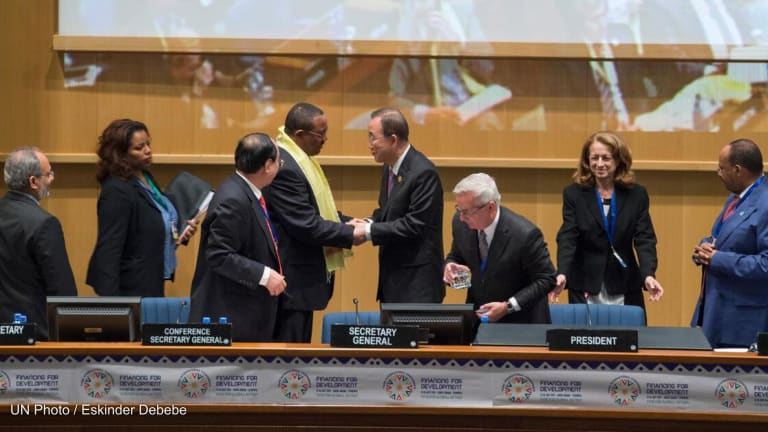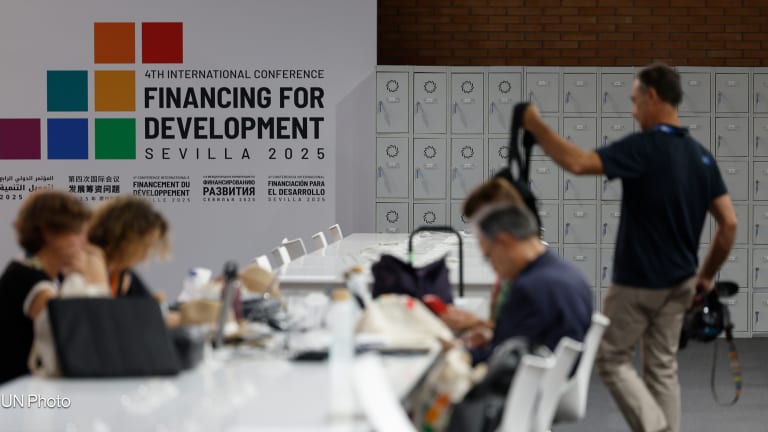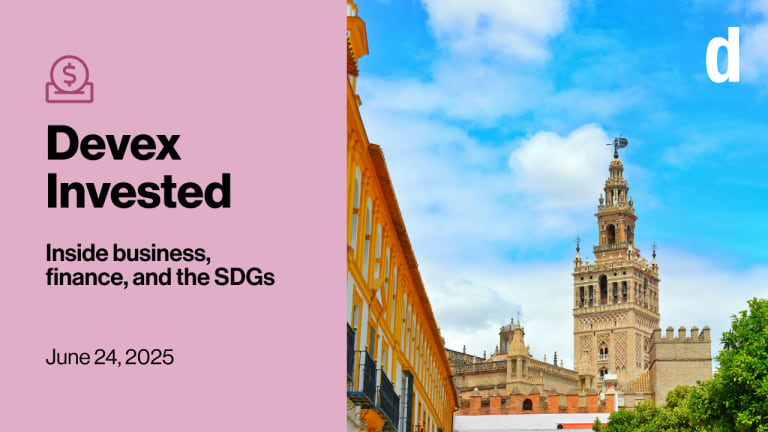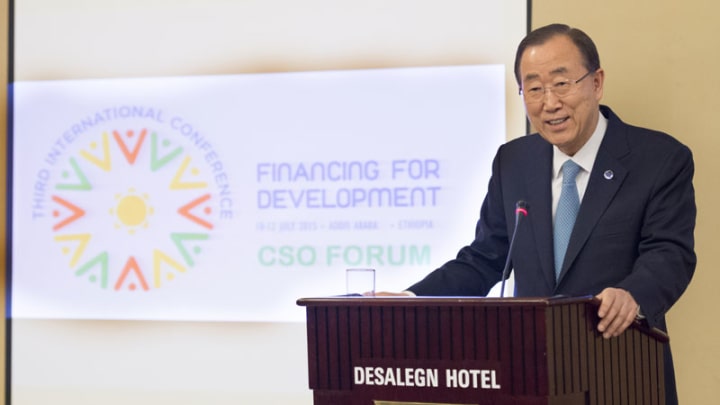
This week, the United Nations is holding the third International Conference on Financing for Development in Addis Ababa, Ethiopia. One of the major development conferences this year, Addis will likely see new initiatives, commitments and partnerships all geared toward its overarching goal: finance the sustainable development goals.
Devex is on the ground at the headquarters of the U.N. Economic Commission for Africa, talking to high-level representatives from donor agencies, nongovernmental organizations and the private sector. We’ll provide continuing updates on the buzz from the weeklong meetings on this running blog, so check back regularly.
What we know so far:
● Three blended finance initiatives were announced: The Sustainable Development Investment Partnership, aimed at unlocking private capital; Convergence, an online platform for information sharing and capacity building; and the RDFI Toolkit.
● The Addis Tax Initiative is launched to support domestic resource mobilization.
● The ONE Campaign is launching data.org.
● The Bill & Melinda Gates Foundation commits to creating a Child Health and Mortality Prevention Surveillance Network, or CHAMPS, as well as building a Global Health Analytics Platform.
● The European Union joins Power Africa, and pledges to allocate 2.5 billion euros ($2.8 billion) in grants from the 2014-2020 budget to support power generation and electricity access across sub-Saharan Africa.
● The Islamic Development Bank has increased funding for activities related to the SDGs to $150 billion in the next 15 years, almost double the amount it spent for the MDGs.
● The Global Partnership for Sustainable Development Data will be launched, and the United States will be a founding member.
● The Organization for Economic Cooperation and Development and U.N. Development Program launched a new initiative that will provide tax audit assistance to developing countries.
● The World Bank and International Monetary Fund announced a joint initiative aimed at strengthening tax systems in developing countries. Civil society organizations meanwhile are wary that the creation of an intergovernmental regulatory body on taxes may not materialize.
● Major international financial institutions announced plans to make $400 billion available in the next three years to finance sustainable development goals.
● The Gates Foundation committed $75 million to the World Bank-managed Global Financing Facility Trust Fund to tackle maternal and child health. This and additional commitments by other bilateral donors bring total mobilized resources for the cause under GFF to $12 billion.
● Canada invests $40 million to jump-start a new partnership between GFF and the International Bank for Reconstruction and Development, which aims to mobilize private sector resources for maternal, newborn and child health.
Updates
7:00 p.m., July 16
It's over, and it's agreed. The third International Conference on Financing for Development has its outcome document, the world has a financing framework for the post-2015 era, and most of us are heading home. Was the Addis conference worth it?
5:45 p.m., July 16
#FFD3: A conversational snapshot
The statements have been made, interviews given and the outcome document agreed, but what did #FFD3 delegates really think about the conference?
We asked a broad selection of them on the sidelines of what's been dubbed by the co-organizers as an "historic event" for the future of global development.
On financing: "I thought we were talking about financing for development here – not development for financing," said one OECD representative referring to the perceived trend among #FFD3 participants to advocate for the use of ODA for incentivizing private sector financing.
On PPPs: According to Roberto Ridolfi, a director at EuropeAid, "We sometimes have to teach public officials how to negotiate good PPPs." The OECD, the U.N., the EU as well as NGOs have all established key principles that should guide these types of negotiations in order to ensure that PPPs contribute to the good of all. According to NGOs present at the conference, however, it is now about ensuring that not only the public but also the private sector abides by those principles.
One UNDP representative echoed this thought during an event on impact financing: "I would rather see the private sector role in finding a win-win in investing in good for all."
On the SDGs: "Don’t get me wrong," said a private sector representative. "You development people are doing an amazing job with – what are they called again? These SDGs you're talking about. I just hope that you don't start artificially ‘socializing’ what we see as being small but successful for-profit businesses.”
On long-term investment: The European Investment Bank welcomed the fact that the development community had finally endorsed the idea of blending and long-term loans as a more sustainable source of development financing. The Norwegian government took this argument to the next level by declaring that the Global Financing Facility, launched on the first day of the conference, had the potential to turn billions into trillions for women’s and children’s health.
Many NGOs strongly opposed these views, warning of a risk of throwing developing countries into irreparable, "Greece-style debt traps."
On mitigating risks: Some organizations offered to help mitigating the risks of blending and long-term loans. The so-called health credit-exchange fund, for example, was presented as a new model for incentivizing the private sector to jump in to cover some for the government’s debt risks associated with borrowing in the health sector. In exchange, private sector entities would receive "reputation" credits, designed to open new doors to private sector investors when trying to access other forms of public finance in future.
On overall impressions: The overall verdict on the #FFD3 outcomes? Romilly Greenhill, Overseas Development Institute's development finance team leader said the "litmus test" of the Addis Ababa Action Agenda is whether it will deliver for the world’s poor. "The accord includes a commitment to a new social compact – a ground-breaking pledge for a basic minimum standard of living for the poorest," she said. "This is a major step forward, although it’s disappointing that there has been no new money to fund it. Governments and donors will have to work hard to turn this ambitious vision into a reality."
What were your impressions of #FFD3 and the outcome document? Have your say by leaving a comment below.
4:30 p.m., July 16
Outcome document adopted
The Addis Ababa Action Agenda, the #FFD3 outcome document, has been formally adopted by the committee of the third International Conference on Financing for Development, with a recommendation that the U.N. General Assembly endorse the outcome at its 69th General Assembly session in September.
3:15 p.m., July 16
What happens when you invest in girls and women? It's simple: We all win
As decision-makers finalize the painstaking negotiations at this week's #FFD3 conference in Addis Ababa, Ethiopia, there's one issue they cannot afford to compromise on: the health, rights and well-being of girls and women. An exclusive op-ed from Women Deliver's CEO.
2:35 p.m., July 16
Breaking out of the bank — new ways to finance a better world
Innovation and collaboration on money matters is not just limited to the corridors of power. Across the globe, public and private organizations of all shapes and sizes are finding clever new ways to make their money do more, for them and ultimately for those in need, writes AidEx's event director in this guest op-ed.
Noon, July 16
CSOs find hope in new social compact
The Addis Ababa Action Agenda reached late Wednesday garnered mixed reactions from different stakeholders. As expected, civil society actors were disappointed at the exclusion of the intergovernmental tax body in the final outcome document.
But there were other items in the agreement they feel positive about.
In the final outcome document, donors reaffirmed their aid commitments, including spending 0.7 of their gross national income on aid. The document also recognized those who are allocating 50 percent of their ODA to least-developed countries, although civil society organizations would have welcomed stronger language to encourage more donors to spend half of their aid budgets in this manner.
Donors fell short of committing to “ambitious timetables” for when they’d be able to meet these commitments, argued Irene Dotterud, spokeswoman and senior advocacy adviser for Save the Children.
The EU collectively recommitted to timetables, but only “within the time frame of the post-2015 agenda.”
“The time frame of the post-2015 agenda is likely to be 2015-2030, which effectively means that the EU has given itself 15 more years to achieve this target,” Dotterud said. “This is certainly not good enough.”
The development ministers of 15 EU countries committed in 2005 to deliver on the 0.7 percent pledge by 2015; only four of them have met this so far.
A new ‘social compact’
The senior advocacy expert also hailed the creation of a new “social compact,” under which countries are “encouraged to consider setting nationally appropriate spending targets for quality investments in essential public services for all, including health, education, energy, water and sanitation, consistent with national sustainable development strategies.”
The language, again, could have been more forceful. Dotterud said that “it is now up to each country to champion this,” starting by creating action plans articulating how they are going to “adequately finance” essential services, such as health and education.
“This may well be what the Addis agreement is remembered for,” she noted. And while the lack of a new global tax body is disappointing, “the genie of international tax reform is well and truly out of the bottle and we expect rapid progress in the coming months.”
“Addis isn’t everything we wished for but it’s an important step forward.”
— Irene Dotterud, spokeswoman and senior advocacy adviser for Save the ChildrenRomilly Greenhill, Overseas Development Institute’s team leader on development finance, shares Dotterud’s sentiment.
“The accord includes a commitment to a new social compact — a groundbreaking pledge for a basic minimum standard of living for the poorest. This is a major step forward, although it’s disappointing that there has been no new money to fund it. Governments and donors will have to work hard to turn this ambitious vision into a reality,” she said, noting that the “litmus test” of the agreement is whether it will deliver for the world’s poor.
10:38 p.m., July 15
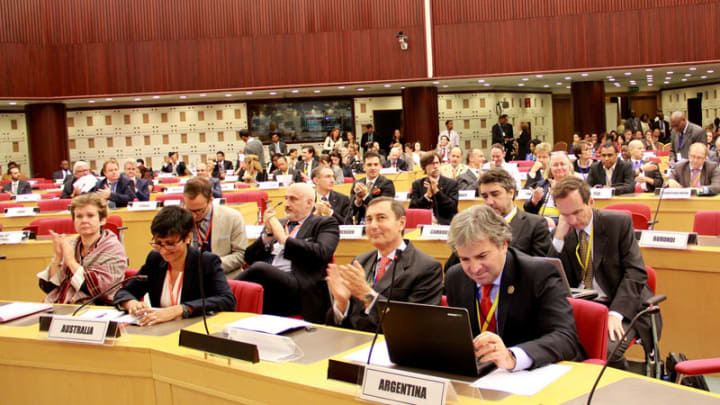
An agreement has been reached
After a lengthy debate into the night an agreement has been reached at the third International Conference on Financing for Development. The Addis Ababa Action Agenda was agreed to by the 193 U.N. member states in attendance.
The United Nations called the agreement a “milestone in forging an enhanced global partnership” in a statement, but civil society didn’t quite see it that way.
U.N. Secretary-General Ban Ki-moon said in a statement that the agreement is a critical step forward.
“The results here in Addis Ababa give us the foundation of a revitalized global partnership for sustainable development that will leave no one behind,” he said in the statement.
Members of civil society are disagreeing with that assessment.
The Action Agenda contains more than 100 concrete measures and addresses multiple sources of finance and covers a range of issues, including technology, science, innovation, trade and capacity building.
Among the key issues highlighted in the document are commitments about domestic resource mobilization and aligning private investment with sustainable development in part by setting the right incentives.
But what’s missing — and what had stalled negotiations — is the creation of a U.N. global tax body. As a result, the OECD will continue to be the intergovernmental body that adopts global tax standards.
Civil society organizations, which were pushing for the tax body, are disappointed in the outcome.
“The decision is an appalling failure and a great blow to the fight against poverty and injustice,” ActionAid’s international tax power campaign manager Martin Hojsik said in a statement. “It means that developing countries, which are losing billions of dollars a year to tax dodging, are not being given an equal say in fixing unjust global tax rules.”
Civil society representatives criticized the deal as the powerful developed countries not wanting to cede power to other countries.
“Rich countries decided to maintain a system where money goes from south to north, but the rules follow the opposite route,” said Pooja Rangaprasad of the Financial Transparency Coalition.
Civil society also expressed concerns that the negotiations were not conducted in good faith and didn’t give developing countries a true voice, which sets a bad tone for the post-2015 and climate negotiations.
7:52 p.m., July 15
‘95 percent of the text is not controversial’
Negotiations are expected to run late into the night Wednesday, with some of the European Union’s 28 member states softening their stance on the possibility of negotiations with G-77 members on an intergovernmental tax body, Devex has learned.
While the United States, the United Kingdom and Japan remain strongly opposed, CSO sources report that there are signs of “thawing attitudes” among other previously opposed developed nations.
But what is the CSO opinion on the potential impact of opening up negotiations on other matters in the outcome document, if parties do eventually agree to negotiate on tax?
Marina Durano, an associate at DAWN, warned there was a risk that, if opened up to discussion, some groups would argue there was too much reference to human rights and gender equality in the current draft document.
But Tove Maria Ryding, tax justice coordinator at the European Network on Debt and Development was unequivocal.
“95 percent of the text is not controversial,” she said. “We’ve spent two-and-a-half days discussing whether there should be a negotiation. ... Is there a risk of losing an agreement? There’s not one single paragraph that I’m going to miss.”
4:37 p.m., July 15
For #FFD3 success after Addis, the devil is in the data
Negotiators in Addis have moved beyond tax evasion roadblocks and are now in the final stages of deliberations. But even if the #FF3 outcome document is finalized, it won’t amount to much unless better information links resource commitments with real-time needs and meaningful outcomes.
2:55 p.m., July 15
“Strengthening the voice and representation of developing countries is very much important” but “I leave it to negotiators.”
— U.N. Secretary-General Ban Ki-moon, when asked if he supports the creation of an intergovernmental tax body2:30 p.m., July 15
More technical assistance toward tax collection, domestic resource mobilization expected under new Addis Tax Initiative
Increased calls for more robust domestic resource mobilization have been met with a mixed response at #FFD3 as different countries and organizations like the OECD launched the Addis Tax Initiative, under which donors are expected to double their technical assistance on DRM, including on tax collection, from now to 2020, Devex has learned.
Civil society organizations welcomed the move, especially as only a small percentage of ODA is channeled toward building developing governments’ ability to raise more of their own money to fund development projects.
But they cautioned this should not divert attention away from the creation of the U.N. intergovernmental tax body, which is currently under intense negotiations.
“It should not divert energy from the drive to create an inclusive intergovernmental process on tax cooperation. Developing countries must have an equal say in the updating of global tax issues that have held them back in filling their public coffers,” said Claire Godfrey, Oxfam’s senior policy adviser.
Godfrey argued the same bodies that supported the creation of the initiative — which includes Germany, the Netherlands, the United Kingdom, the United States and the European Commission — should also rally behind the inclusion of the intergovernmental tax body in the final outcome document.
2:21 p.m., July 15
Insurance, 'an essential policy instrument' for the SDGs
Insurance is essential to help the world's poor bounce back from the devastation of extreme events and help them withstand natural hazards, but insurance premiums don't usually rank high in budgets of poor households. How then can donors and governments help cultivate low-cost insurance schemes for the poor?
1:32 p.m., July 15
‘Don’t get too fascinated by private money’
Despite much talk about the need for more private money and the blending of public and private resources to finance sustainable development, civil society organizations are keen to point out the strong need for public funding, especially official development assistance. This is especially true for sectors that provide basic needs such as water and sanitation, according to experts at a special #FFD3 event organized by WaterAid.
“Many donors do not pay enough attention to that sector,” said Thomas Kaydor, Liberian minister of foreign affairs. “They invest more in political, than in economic rights and do not see how these are equally important.”
Guido Schmidt-Traub, executive director at the U.N. Sustainable Development Solutions Network, supported this view, stressing the importance of ODA for the improvement of water and sanitation in developing countries. Though private investment could be interesting with regard to some bigger water projects, Schmidt-Traub said “most of the projects are still centered around providing poor people with access to clean water and basic sanitation facilities. ... Poor people are not a market.”
12:59 p.m., July 15
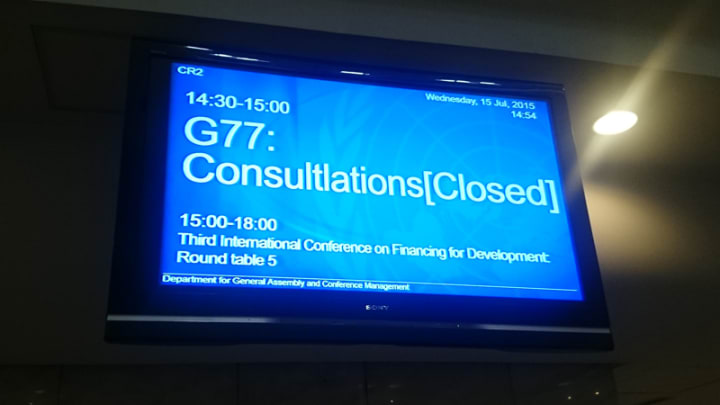
Negotiations on the outcome document set to resume
Outcome document negotiations are set to resume 1 p.m., following yesterday’s standstill.
Devex has learned that tax negotiations are starting to pick up, with South Africa and Ethiopia coming up with a compromise proposal that redesignates the committee as the Intergovernmental Committee of Experts on International Cooperation in Tax Matters.
According to the draft, “members of the committee will be directly nominated by governments through respective regional groups and appointed by ECOSOC, to be drawn from the fields of tax policy and tax administration, and will continue to act in their expert capacity.”
However, the proposal ends with an invitation to ECOSOC to eventually turn the Committee of Experts into a “universal body with equitable participation of developing countries.”
While the proposal is something civil society organizations can work with, it is clear that an intergovernmental expert committee will not have the decision-making status and power of an intergovernmental U.N. tax body. But because it falls in the gray zone, the expert committee might also be able to develop into something bigger — “a universal body” — without violating its mandate.
Another contentious issue is the membership of the expert committee, which is composed of individuals, not governments. This means that accountability may be harder to ensure. Further, with a limited number of members, this could mean that more than 100 countries will still not be able to participate equally in the negotiations on global tax standards, unless the mentioned “universal body” is created.
12:19 p.m., July 15
How the UK can strengthen the #FFD3 outcome document
The current draft of the outcome document, currently under negotiation, doesn't yet deliver the financial framework needed to build the world we want. There are three things the U.K. government can do to make the critical difference, Bond's policy adviser writes in this guest commentary.
12:00 p.m., July 15
If there’s anything that the next set of development goals and climate change have in common, it is that they both have insufficient financing, according to a representative from Nicaragua, who questioned the idea of searching for new sources of finance when there are already existing agreements — such as the agreement on countries spending 0.7 percent of gross national income on aid — in place that could fill current needs, if only they are met.
He echoed the same sentiment on climate change, and noted the difficult position by finance ministers.
“Who says climate change begins in 2020?” he said. “I think $100 billion is going to have any credibility moving forward if it starts happening in 2016. But [it would be impossible] to think $100 billion is going to fall out of [thin] air by 2020.”
“If any of us were to present a plan or program with ambitious time-bound goals, we’d be expected to answer [questions on] ‘what’s the cost and funding? Do we have the technology and capacity to realize that? And if none, how do we plan to deal with that?’ If we can’t answer those, then we’d be laughed at.”
11:46 a.m., July 15
In discussions on policy coherence, a representative from Lesotho called on its development partners to assist the country in building the human resources and skills of its ministries, and strengthening coordination between them.
The call is meant to help the country achieve its objectives under a new strategic development plan that articulates its national development priorities and is therefore expected to eat a larger share of the country’s national budget.
The plan would require cooperation between actors. However, the country is already experiencing challenges toward cooperation between its own ministries, who often work in silos, making it difficult to implement coherence toward the country objectives.
11:30 a.m., July 15
In Latin America and Caribbean, more efforts are being done to increase domestic resource mobilization. The decision is taken to maintain sovereignty, but also driven by the small inflows of official development assistance to the region.
“Here ODA is no longer a choice; we only receive $10 billion of ODA compared [with foreign direct investments], which is at $160 billion,” said Alicia Barcena, executive secretary of the U.N. Economic Commission for Latin America and the Caribbean.
The issue however is that public expenditure plans are almost always taken by finance ministers, whose task, Barcena said, is almost always to say “no” to everything.
She argued such decisions should be taken by a wider set of actors, especially for purposes of development — a sentiment shared by renowned economist Joseph Stiglitz at a roundtable meeting Tuesday.
“Finance in development is too important to be left to finance ministers alone,” he said.
But the question is: How can this fiscal space be opened?
8:00 a.m., July 15
Different stakeholders from governments, international organizations, businesses and civil society actors made commitments toward a data revolution at an event hosted by the ONE Campaign, U.N. Economic Commission for Africa, U.N. Sustainable Development Solutions Network, and the U.S. and Mexican governments.
The Gates Foundation announced plans to create CHAMPS, a network of disease surveillance sites in developing countries whose main role is to gather data on how and why children are getting sick and dying, and where they are located. This will be valuable in providing capacity in the event of another epidemic, like Ebola. The philanthropic foundation plans to invest an initial $75 million to realize this concept.
The foundation is also building a Global Health Analytics Platform that will allow for better pooling, understanding and use of data for analysis, and is currently involved in a mapping effort for neglected tropical diseases.
The Children’s Investment Fund Foundation will invest in improving data on nutrition coverage and interventions in at least four countries. In addition, the ONE Campaign is launching “Follow the Money” — which the organization envisions to be a one-stop-shop for best practices in using data to track corruption, allocate budgets better and ensure public resources reach their intended purpose.
The United Kingdom, for its part, is exploring additional contributions to the World Bank-managed trust fund for statistical capacity building, and has announced an additional 6 million pounds ($9.3 million) to PARIS21. This new funding is aimed at helping developing countries improve their national statistical systems. The U.K. is also planning to partner with the Global Open Data for Agriculture and Nutrition Secretariat and organize a GODAN summit in 2016.
The United States has meanwhile allocated $3 million from the U.S. President’s Emergency Plan for AIDS Relief toward the creation of a Secretariat for the Global Partnership for Sustainable Development Data. This is supported by a $2 million from the Hewlett Foundation. PEPFAR and the Millennium Challenge Corp., through a partnership, will also invest $21.8 million to realize multistakeholder collaborations in sub-Saharan African countries, which would enable the use of broader health, gender and economic growth data to better inform local programming and increase impact.
The bilateral donor commits to releasing PEPFAR procurement transaction data by the end of 2015 as well, and announced plans to support the work of the GODAN Secretariat.
The World Bank Group meanwhile will soon be establishing a Trust Fund for Innovations in Development Data, among other things. The trust fund aims to raise $100 million in five years.
7:49 a.m., July 15
G-77 back down on tax body imminent?
#FFD3 host Ethiopia is now pushing the Group of 77 to compromise on the inclusion of wording around an intergovernmental tax body in the final outcome document, Devex has learned, fearing failure to secure a resolution would impact public relations and put the conference outcome in jeopardy. According to sources here in Addis, there are no official negotiations at the moment, only bilateral talks. But one bonus for the co-facilitators is the fact that country representatives have not left en masse last night after a dinner as rumored. Updates later today.
5:00 a.m., July 15
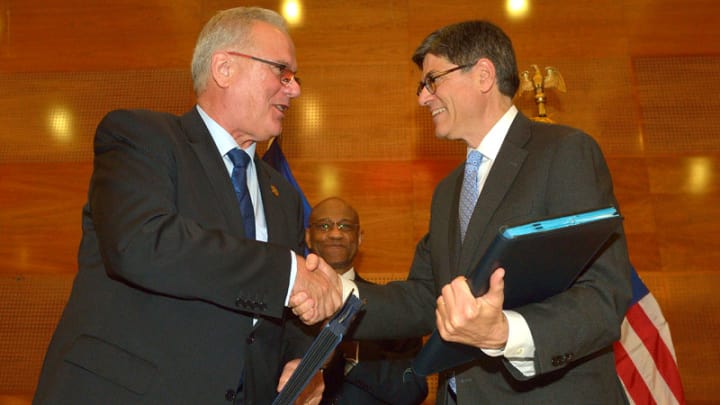
EU development commissioner Neven Mimica and US treasury secretary Jacob Lew signed a Memorandum of Understanding on Power Africa, unlocking an additional 2.5 billion euros ($2.8 billion) in financing to address the huge energy deficit facing sub-Saharan African countries.
The additional funding is expected to leverage further private sector resources, which partners are banking on, particularly as financing necessary for energy infrastructure is “larger than development partners or emerging market governments can cover on their own,” Lew said in a statement.
Stay tuned for more updates on this new partnership, including from an exclusive press briefing with Secretary Lew attended by Devex senior reporter Michael Igoe.
5:45 p.m., July 14
U.N. Economic and Social Commission for Asia and the Pacific Secretary Shamshad Akhtar talked about the role of partnerships in opening up more sources of funding. While official development assistance has played a vital role in the Asia-Pacific region, it cannot keep up with the currently huge demand.
She called for partnerships — particularly global partnerships of tax experts to unlock the tax potential of Asia-Pacific countries, which can collectively mobilize as much as $1.3 trillion — to build countries’ capacities to boost domestic resource mobilization.
“[Relegating] this area to [multilateral development banks that have] been doing this for years with mixed results won’t be sufficient,” Akhtar said.
5:32 p.m., July 14
U.N. Secretary-General Ban Ki-moon has called on businesses to be “partners in supporting and financing” the post-2015 development goals that is expected to be finalized in September.
“I urge private sector leaders — including CEOs and institutional investors — to be part of the solution, and to consider new commitments for investment in sustainable development,” he said at a business forum on the sidelines of the Financing for Development event in Addis Ababa that was attended by more than 400 CEOs and business leaders.
There were a lot of discussions on the important role of private sector in realizing the next set of development goals, but there were also calls for them, particularly multinational companies, to take on their tax responsibilities — an area that has elicited debate in different forums and sessions at the event.
At a roundtable discussion, a representative from KPMG, one of the largest tax, audit and advisory firms globally, noted how “attitudes are changing” on tax responsibility, but that there are still some private actors that are not demonstrating “good behavior in this area.”
Stay tuned for more insights from the sidelines of the business forum, including from MasterCard, KPMG and Philips.
5:48 p.m., July 14
What's needed from Addis: 'A mandate to do more and to do better'
In this Devex exclusive, IFAD's chief development strategist explains how #FFD3 should be an opportunity for development stakeholders to unlock already available resources, scale up proven models and forge strategic partnerships.
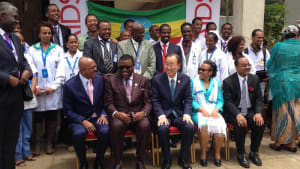
4:38 p.m., July 14
UNAIDS chief: Today's HIV epidemic is 'completely different'
What will it take to translate 15 years of success in combating HIV into an AIDS-free generation by 2030? Devex spoke with Michel Sidibe, executive director of UNAIDS, on the sidelines of the financing for development conference in Addis Ababa.
4:26 p.m., July 14
Jeffrey Sachs tells delegates at an #FFD3 roundtable to scout their “neighborhoods” for the “friendly billionaire.”
“I’m going to tell you a little secret, if you want to know a secret: there are 1,826 billionaires in the world today, and their combined net worth is $7.1 trillion. So go find your friendly billionaire and tell her or him that they can help solve the global education challenge,” he said. “There are a few on my email list I’m working on. … They need to step up and do something right now.”
3:41 p.m., July 14
It’s all about the money: Tax in sharp focus at #FFD3
Tax is the talk of the town in Addis Ababa, Ethiopia, this week at the third International Conference on Financing for Development. But do we need tax reform to effectively finance development?
Here in Addis, there are a range of opinions on show.
Speaking July 12 at an event hosted by Friedrich Ebert Stiftung and the Independent Commission for the Reform of International Corporate Taxation, Jane McCormick, KPMG’s head of tax for Europe, the Middle East and Africa characterized current efforts as “putting patches on a system that isn’t fit for purpose … we need a new set of international tax rules.”
Nobel Prize-winning economist Joseph Stiglitz said there is recognition that #Fin4Dev is not only about official development assistance, but increasingly about the revenues countries generate on their own through domestic resource mobilization. OECD is doing good work through its base erosion and profit shifting initiative, he said, but that it is “trying to fix a system that cannot be fixed … We need a new path and a new framework.”
Stay tuned for more from Stiglitz, who spoke exclusively to Devex Associate Editor Richard Jones in Addis.
Stiglitz recommended that the importance of the U.N. tax office should be elevated, with the voices of every country represented.
“Let’s strengthen the U.N. not sideline it,” he said. “Development is too important to be left to finance ministers — it’s about more than money.”
The house is burning
Pascal Saint-Amans, director of the OECD’s Center for Tax Policy and Administration, admitted the need for reform.
He urged an end to bank secrecy, calling for an automatic exchange of information. He also called for a “fix” of corporate income tax, saying that trillions of dollars is being lost to inaction in many jurisdictions.
“But do we set up a commission and wait 10 years, or do we try to fix the problem now?” he said, adding, “The house is burning down.”
Saint-Amans however refused to set OECD against the U.N. on tax issues, preferring instead to work together with the body and all member states in a constructive manner on tailor-made solutions to issues such as tax and transfer pricing.
“The U.N. is everybody after all,” he said, “including the tax havens.”
Tax problem 'not solved'
Jose Antonio Ocampo, chair of the Independent Commission for the Reform of International Corporate Taxation, said the first responsibility of business is to pay their taxes toward a “triple bottom line” for good corporate social responsibility practices.
Winnie Byanyima, executive director at Oxfam International, agreed and quoting an UNCTAD report said developing countries lose $100 billion each year to “tricks” of sending money through tax havens, in addition to $138 billion because of “overgenerous” tax incentives — a “trick” to conduct “robbery on an industrial scale” of developing countries’ tax revenues.
She pointed to the example of Sierra Leone during the recent Ebola crisis, juxtaposing the low levels of investment in the public health system, with 2012’s loss of revenues through tax incentives that amounted to 12 times the West African country’s health budget.
“Tax is literally a matter of life and death,” she said, adding that it shouldn’t be forgotten that poor women were central to this discussion.
Byanyima called for a U.N. treaty to combat abusive tax practices and reiterated a call heard loud and clear at last weekend’s civil society forum in Addis, for the formation of an intergovernmental body on tax.
“We have a world body for food, trade, health, even football … but not tax.”
— Winnie Byanyima, executive director at Oxfam InternationalThe demand is gaining ground among members of the G-77 and continues to be a thorn in the side of the FFD3 co-facilitators, the European Union’s 28 member states and the European Commission, which fear that re-opening discussions at this late stage in proceedings puts the whole outcome document in jeopardy.
It remains to be seen this week whether there is some room for negotiation.
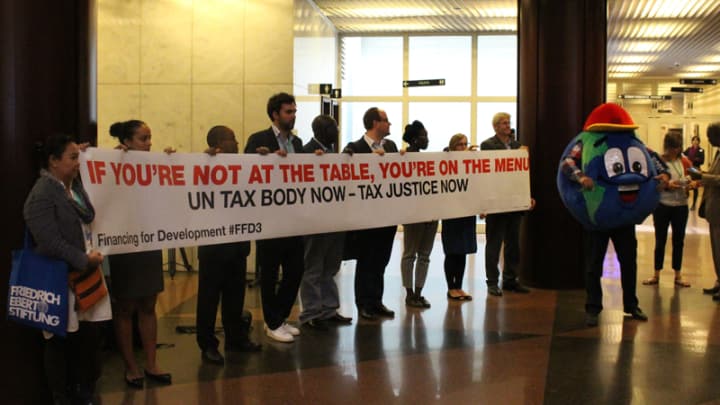
3:34 p.m., July 14
Governments have a role in unleashing private capital
Businesses are gathering Tuesday in Addis Ababa, Ethiopia, to discuss how they can invest in the sustainable development goals, support economic growth, foster innovation and operate using responsible business practices. But they can't do it alone — governments are critical in creating strong enabling environments that make a business case for private capital in development.
1:45 p.m., July 14
A roundtable discussion on policy coherence yielded a number of examples, asks, and suggestions, from how to ensure coherence between national and international objectives, and between public and private finance.
But Thabo Mbeki, former President of South Africa, was right on point when he said that, in the end, the conference must be able to answer the goals set out in the outcome document – to further strengthen the framework to finance sustainable development, and the means of implementation of the post-2015 agenda.
“All of us are of the same mind … that statements made must not be lip service, but reflect our commitment to achieve [the things] we said we need to achieve,” he said.
1:20 p.m., July 14
A representative of the Group of 77 and China, considered the largest intergovernmental organization of developing countries in the United Nations, shared in one of today's plenary sessions the importance of south-south cooperation in the future of international development finance.
He explained that pursuing a south-south strategy cannot (and should not) absolve developed countries from fulfilling their aid commitments, and that the agenda for this kind of cooperation should be set by those nations from the global south. The official shared that "south-south cooperation is not a substitute, but a complement for north-south cooperation."
Interestingly, the representative also shared the group's advocacy of encouraging donors to give aid commitments and disbursements in a similar way as China conducts its aid program — particularly in the African region — including nonconditionality and noninterference in domestic affairs, among others.
12:17 p.m., July 14
A new approach in the development relationship between Kazakhstan’s government and UNDP helped turn the oil- and coal-rich country into an emerging player in wind energy in the region. Such dynamic strategic partnerships are essential if we truly want to create a better world, says Haoliang Xu, U.N. assistant secretary-general and UNDP's regional director for Asia and the Pacific.
10:59 a.m., July 14
Addis negotiations on hold?
Outcome document negotiations are at a standstill, Devex has learned, with the EU and G-77 in disagreement.
Yesterday evening, we heard that the G-77 nations had effectively been given until 3 p.m. local time by the conference co-facilitators to accept the current draft text, which does not upgrade the U.N. tax committee to intergovernmental status. Otherwise, the whole text could be removed.
Observers from civil society organizations have said that it was tantamount to an ultimatum.
What we’re hearing from CSO sources this morning is that the G-77 are holding firm, with a number of them indicating that they want a genuine compromise.
EU Commissioner for International Cooperation and Development Neven Mimica said in a news conference that he — and the bloc’s 28 member states — are pushing for the document to be signed as it stands, otherwise risking the whole process. Indeed, the EU thinks the hope of closing the text fast might be fading.
We could be in for some long nights ahead.
Calls for a tax body
CSOs and G-77 are pushing for the existing tax committee at the United Nations to be upgraded into an intergovernmental body, which they argue would mean that both industrialized and developing countries have a role in making and monitoring international tax rules.
CSO sources told Devex that the OECD currently “holds the reins” on this, and developing countries have little or no influence. CSOs are also lamenting a situation where developing countries are estimated to be losing around $1 trillion in illicit financial flows each year, around 80 percent of which is understood to be lost from trade misinvoicing, when goods traded across international boundaries are incorrectly priced to help to avoid tax.
A new U.N. intergovernmental committee, CSOs argue, can rectify this by ensuring better data collection and transparency. This could potentially help developing countries recoup hundreds of millions or even billions of dollars in tax that they are currently missing out on, with the thinking that these additional resources could be channeled toward basic services.
9:04 a.m., July 14
Jeff Sachs, noted development optimist, delivers some sobering assessments of the global climate future:
“I don’t actually believe the idea that it’s all great, because we’re going to innovate all kinds of things ... Our disaster relief systems are broken completely, because they’re overwhelmed…believe me, we can’t handle this,” he tells Addis attendees at a climate finance side event.
10:53 p.m., July 13
Taxes are a hot topic at #FFD3 — how do we leverage them for development and keep them fair globally?
8:30 p.m., July 13
The case for more unrestricted funding
Why should donors give more — or less — unrestricted funding to nonprofits and charities? Devex asked fundraising experts from three of DfID’s top NGO partners to find out.
6:05 p.m., July 13
Oxfam is calling for the new Global Financing Facility to support free services that are integrated into national health plans and align with existing programs.
“Since women's and children's health cover a spectrum of services, we need the Global Financing Facility to focus on building comprehensive and resilient public health systems across the developing world,” Claire Godfrey, Oxfam’s senior policy adviser, said in a statement.
Godfrey also expressed concern on emphasizing results-based financing, which she said is easily measured but may not have the greatest health impacts. She also called for clarification on the role of the private sector and the International Finance Corp. to ensure that commercial interests don’t override local needs and wishes.
5:50 p.m., July 13
Under the Tax Inspectors Without Borders program, tax experts will provide audit assistance in developing countries, building local capacity along the way as they work with local officials. The experts are also expected to educate local officials on international tax matters.
Pilot projects and workshops are already underway in Albania, Ghana and Senegal.
The program will have a secretariat based at the OECD office in Paris, France, and will be supported by an oversight board. It will serve as a clearinghouse that will match demands for audit assistance worldwide.
4:28 p.m., July 13
To bring the issue of migration to the top of the development agenda, International Organization for Migration Director-General William Lacy Swing said his organization will:
● Launch an International Migration Policy Index.
● Present a Migration Governance Framework.
● Establish data analytics centers in Berlin, with support from the German government.
3:20 p.m., July 13
It's time for development policy practitioners to admit: We have a data crisis. ONE co-founder Jamie Drummond weighs in on why the development community needs "factivists" to drive an open data movement for accountability and action.
“It’s hard to target funds efficiently when the people whom they are intended to help aren’t even accounted for. A quarter of countries where the poorest people live are using data on extreme poverty that is at least a decade old”
— Jamie Drummond, ONE co-founder3:58 p.m., July 13
OECD Secretary-General Angel Gurría called for “dramatic revolution” on data information sharing during a roundtable discussion on global partnerships and the different dimensions of sustainable development.
2:08 p.m., July 13
The African Leaders Malaria Alliance has convened a high-level panel to discuss financing gaps for malaria eradication, which costs the African continent $12 billion per year in lost productivity, Ethiopian Prime Minister Hailemariam Desalegn said.
1:53 p.m., July 13
$10.5 billion is needed over the next three years to implement #malaria control and prevention plans.
1:51 p.m., July 13
How better standards and better data can help deliver sustainable #Fin4Dev outcomes
Timely and comprehensive open data can be a crucial tool to monitor post-2015 commitments and progress and will also be critical for different civil society organizations to use for accountability, Jeannet Lingán, Publish What You Fund’s head of policy and advocacy, writes in this guest commentary.
1 p.m., July 13
● At the opening plenary session, Somali President Hassan Sheikh Mohamoud talked about the potential of remittances in sustaining development programs, and called for a lowering of transaction costs to less than 3 percent.
● Namibian President Hage Geingob called for partnerships that are considered equal, and based on transparency and mutual trust.
The GFF, which is expected to be a “game changer” in development financing for maternal, adolescents and child health, officially launches.
Already, the facility has secured $12 billion to finance the development plans of a number of African countries, including the Democratic Republic of the Congo, Ethiopia, Kenya and Tanzania, according to World Bank Senior Director for the Health, Nutrition and Population Global Practice Tim Evans.
These pledges include Canada’s $40 million commitment to jump-start a new partnership between GFF and the World Bank Group’s IBRD, and will focus on two priorities: strengthening “front-line” health systems, including increasing the number of community health workers; and malaria control, which in some places continue to be the biggest cause of under-5 mortality.
Canada is also contributing to the GFF Trust Fund, joining the United States, Japan and the Gates Foundation, bringing total commitments to $214 million.
The facility is meant to close the annual financing gap of close to $33.3 billion for reproductive, maternal, newborn and child health.
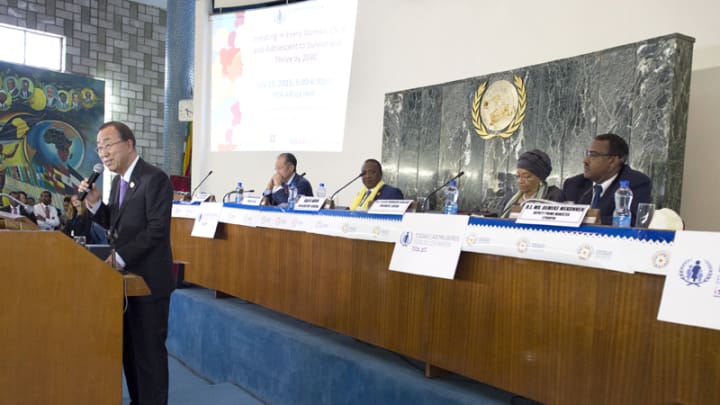
9:42 a.m., July 13
Better financing? We also need better data
The president and CEO of the Overseas Private Investment Corp. suggests three ways to make use of private capital in development:
1. Build more effective tax systems in developing countries.
2. Incentivize private investment so it would go to areas such as women empowerment, energy, health and education.
3. Use data to inform investment strategies and decision.
“It is not enough for the development community to know, for example, that off-grid power systems can be helpful to the impoverished in rural areas. We need to know which types of off-grid systems are the most helpful.”
— Elizabeth Littlefield8:58 a.m., July 13
CSOs to donors: Meet your 0.7 percent commitments
This is one of the major commitments organizations are hoping donors will promise to meet at #FFD3, as well as pledges to increase the proportion of official development assistance going to the least-developed countries.
But the question is: Is there any interest at all to discuss this 40-year-old commitment?
5:02 a.m., July 13
As #FFD3 kicks off in Addis, civil society raises red flags
During the weekend, civil society organizations repeated calls to create an intergovernmental regulatory body to deal with tax evasion and avoidance by multinational corporations. The tax body is nowhere in the outcome document already negotiated months before.
“We read the document, we looked for ambition, and we didn’t find it.”
— Tove Ryding, policy and advocacy manager at the European Network on Debt and Development11:45 p.m., July 10
#FFD3 is "critical to funding the brave new agenda" of the sustainable development goals in September and the climate change agreement in December, according to Philip Goodwin, CEO of VSO, one of several members of Action/2015 — a campaign that draws together organizations worldwide — speaking in London, U.K., on Friday.
Without the right funding in place, "ambitious goals to tackle poverty and climate change in the future will be nothing more than paper statements ... We've seen too much development cooperation in recent years that focuses simply on finance and aid. Such an approach fails to build peoples' own capacity to define and solve the challenge of poverty themselves and to question the structures that perpetuate poverty,” he said.
3:33 p.m., July 10
The World Bank, along with six major development finance institutions that includes the IMF, have announced it will make available $400 billion in financing for the next three years to jump-start the next set of development goals — no doubt the main dish at the event.
It’s a huge sum, but World Bank President Jim Yong Kim argues it will still not be enough to accomplish the tasks ahead, from dealing with climate change to addressing the next pandemic.
“We need trillions, not billions, of dollars to accomplish these goals,” he said.
Those resources will need to come not just from multilateral development banks, but even from bilateral donors, the private sector and developing countries themselves — mainly through taxes, another major issue that civil society is hoping to be taken seriously at the event.
1:34 p.m., July 7
What to expect from Addis Ababa
Getting the private sector on board is also major item on the agenda, but as Devex senior development reporter Michael Igoe argues in this video preview, this needs to happen without taking the limelight out of important conversations on official donor assistance and its future role.
“Some worry the intense focus on crowding in the private sector is actually crowding out some difficult conversations about what official donor assistance really needs to do and how much of it is needed in the future,” he said.
Devex is in Addis to give you the inside track on #Fin4Dev. Follow @Devex, @richard_devex and @AlterIgoe to get the latest news and developments from #FFD3.

